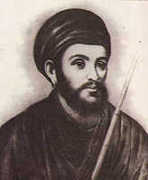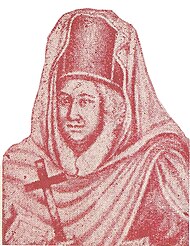East to West and West to East pilgrimage : Pilgrimage to Poondi Matha : Constanzo Beschi

Constanzo Beschi
Constanzo Beschi, also known under his Tamil name of Vīramāmunivar or Constantine Joseph Beschi was an Italian Jesuit priest, Missionary in South India, and renowned poet in the Tamil language.Wikipedia
Born: November 8, 1680, Castiglione delle Stiviere
Died: 1747
What is the history and ideology of veeramamunivar? |
Constanzo Beschi
From Wikipedia, the free encyclopedia
| This article includes a list of references, but its sources remain unclear because it has insufficient inline citations. (January 2008) |
Constanzo Beschi, also known under his Tamil name of Vīramāmunivar (Tamil: வீரமாமுனிவர்) or Constantine Joseph Beschi (in English) (8 November 1680 – 1742) was an Italian Jesuit priest, Missionary in South India, and renowned poet in the Tamil language.
Contents[hide] |
Early years and formation [edit]
Born in Castiglione delle Stiviere, Mantova, Italy, Beschi got his secondary education in the Jesuit High School of Mantova. After becoming a Jesuit in 1698[1] he was trained in Ravenna and Bologna from where he requested, and obtained, from Superior GeneralMichelangelo Tamburini the permission to be sent to the Madurai mission in South India. Sailing from Lisbon he reached Goa in October 1710, from where he proceeded immediately to South India. He arrived in Madurai in May 1711.
In Tamil Nadu (Madurai Mission) [edit]
During the first six years, he worked as missionary in Elakurichy (ஏலாக்குறிச்சி), a town nearTiruchirapalli. Then he served as parish priest in Kamanayakkanpatti one of the oldest mission centers in Tamil Nadu. Also he visited several important centers such as Tirunelveli,Ramanathapuram, Thanjavur and of course Madurai, in order to learn the Tamil language. He met with persecution in 1714-15, and escaped a death sentence thanks to the influence of a Hindufriend. The hostility of local kings prevented him from visiting Christian communities. This gave him more time to master the Tamil language in which he soon showed great proficiency.
Inculturation [edit]
Inspired by what was done in China Beschi adopted an Indian life style and introduced elements of Hindu esthetics even in the Christian statuary. Similarly the churches he built (Poondi Matha Basilica at Poondi near Thanjavur, Periyanayagi maadha shrine at Mugasaparur in Konankuppam, and Adaikala maadha shrine at Elakurichi) in their architectonic lines, are inspired by Hindu temples. These churches are now Catholic pilgrim centers.
Two teak wood cars built by him are still on view in Kamanayakkanpatti. He made himself asannyasi (Indian ascetic) and adopted their saffron coloured dress. His facility in making friendship, along with his cultural competence and obvious religious commitment gave him much influence which he used in order to protect Christians against exploitation andpersecution. He is said to have baptized 12,000 people. He worked in the Thanjavur area till 1738 and settled in 1740 on theCoromandel coast where he remained till the end of his life. He died at Manappar near Tiruchendur, India.
Master of Tamil literature [edit]
Though he was primarily a missionary, he is also known as a classical writer of Tamil literature. Besides composing a literary Tamil grammar, he also wrote a grammar for the common use of Tamil - the first to do so - which earned him the title of Father of Tamil prose.[citation needed] He compiled several Tamil dictionaries: including the Chaturakarati (சதுரகராதி), the quadruple lexicon containing words, synonyms, categories of words, and rhymes; a Tamil-Latin and Latin-Tamil-Portuguese dictionary.
His greatest poetical work is the Thembavani (தேம்பாவணி) (the Unfading Garland), an extraordinary epic poem - 3615 stanzas long - on Salvation history and the life of Saint Joseph. It is considered a classic of Tamil literature. He also wrote a prabandham (one of theminor literature) called Kavalur Kalambagam (காவலூர் கலம்பகம்), a grammatical treatise called Thonnool (தொன்னூல்), a guide book for catechists with the title Vedhiyar Ozukkam (வேதியர் ஒழுக்கம்), and Paramarthaguruvin kathai (பரமார்த்த குருவின் கதை), a satirical piece on a naive religious teacher and his equally obtuse disciples. His prose works include polemical writings against the Lutheran missionaries and didactic religious books for the instruction of Catholics. He prepared a vademecum for newly arrived missionaries.
A man of dialogue [edit]
Local traditions abound of stories of Beschi challenging Hindu ascetics and winning debates over them. Yet his Thembavani meaning "ornament of poems as sweet as honey" is proof that he had a positive approach to Hinduism, as he often uses phrases, ideas and myths characteristic of Hinduism. The same spirit of dialogue and admiration for the Tamil culture led him to translate and explain in Latin the famous Thirukkural epic poem of Thiruvalluvar (1730). This Latin work was an eye opener for European intellectuals, discovering truth and beauty in a Tamil literature. They also found it to contain many thoughts similar to Christianity.
Recognition [edit]
Beschi was one of the best known Jesuits of the 18th century in Tamil Nadu. In 1968 the State of Tamil Nadu erected a statue for Beschi on the Marina beach in the City of Madras (Chennai), as a recognition for his contribution to the Tamil language and literature.
See also [edit]
- Poondi Matha Basilica (பூண்டி புதுமை மாதா திருத்தலம்)
- Elakurichi (Adaikala Matha Church) (அடைக்கல மாதா திருத்தலம்)
- Kamanayakkanpatti Church of Our Lady of Assumption (பரலோக மாதா திருத்தலம்)
- The Perianayagi Madha Shrine,[2] Konankuppam(பெரிய நாயகி மாதா திருத்தலம்)
References [edit]
- ^
 "Costanzo Giuseppe Beschi". Catholic Encyclopedia. New York: Robert Appleton Company. 1913.
"Costanzo Giuseppe Beschi". Catholic Encyclopedia. New York: Robert Appleton Company. 1913. - ^ http://www.pondyarchdiocese.org.in/konankuppam.htm
- Besse, L.: Fr.Beschi: his times and his writings, Trichinolopy, 1918.
- Giachi, G.: L'India divenna la sua terra, Milan. 1981.
- Sorrentino, A:: L'altra perla dell'India, Bologna, 1980.



Comments
Post a Comment